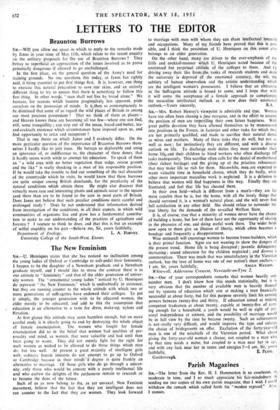The New Feminism
Sta.—U. Henriques states that she has noticed no inclination among the young ladies of Oxford or Cambridge to soft-pedal their femininity. I happen to be the daughter of a Newnham graduate, and a Newnham graduate myself, and I should like to stress the contrast there is in our attitude to " femininity" and that of the older generation of univer- sity women. The "ornamental young ladies" noticed by U. Henriques do represent " the New Feminism," which is undoubtedly in existence, but they are running counter to the whole attitude with which two or more generations of suffragettes have endowed their colleges. To put it simply, the younger generation wish to be educated women, the older merely to be educated, and add to this the assumption that education is an alternative to a taste for dress, make-up, nylons and flirtation.
At first glance this attitude may seem harmless enough, but on more careful study it is clearly going to end. by destroying the whole object of female emancipation. The women who fought for female emancipation did so in the belief that women had qualities of per- sonality and mind, as women, that were valuable and had until then been going to waste. They did not merely fight for the right for such women as wished to be allowed to do those things which men
do, but less well. At present a great majority of intelligent girls with ordinary female interests do not attempt to go up to Oxford
or Cambridge because in their minds '1 degree is quite frankly an alternative to marriage. Of those girls who do go through a univer- sity, only those who would be content with a purely intellectual life and who eschew the delights of the porfumerie remain to research or to become the dons of the tuture.
Such of us as now belong to the, as yet unvocal, New Feminist movement, believe that the fact that they are intelligent does not run counter to the fact that they are women. They look forward to marriage with men with whom they can share intellectual interests and occupations. Many of my friends have proved that this is pos- sible, and I think the pessimism of U. Henriques on this count also belongs to an older generation.
On the other hand, many are driven to the over-emphasis of the frills and cocktail-manner which U. Henriques noted because of the unstressed but perpetual attitude of the colleges to them. And by driving away their like from .the ranks of research students and dons the university is deprived of the emotional accuracy, the wit, the subtlety of human observation and this artistic understanding which arc the intelligent woman's possessions. 1 believe that an alteration in the Suffragette attitude is bound to come, and I hope that with it will come the acceptance of a female approach to complement the masculine intellectual outlook as it now does their emotional






































 Previous page
Previous page